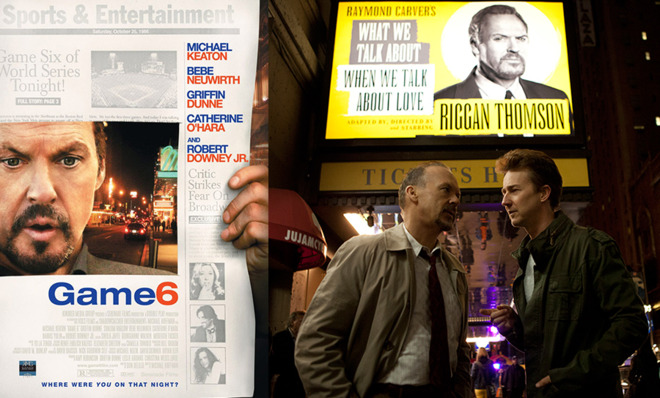Game 6: The all-but-forgotten movie that blazed the trail for Birdman
A decade-old Michael Keaton-starring drama tackled the same ideas as the new Michael Keaton-starring drama — and had much more to say about them


A free daily email with the biggest news stories of the day – and the best features from TheWeek.com
You are now subscribed
Your newsletter sign-up was successful
Stop me if you've heard about this movie: Michael Keaton plays a playwright who can't catch a break. His play is about to begin its Broadway run, and his star actor is pathologically unreliable. A theater critic threatens to make or break the show. The playwright's rebellious daughter seethes with resentment. His ex-wife thinks he's a loser. His charms are lost on his mistress.
Believe it or not, I'm not talking about Birdman, the new Michael Keaton-starring film drawing rave reviews, Oscar buzz, and breathless hyperbole about the resurrection of Keaton's career. I'm talking about Game 6, an unjustly overlooked collaboration between Keaton, screenwriter Don DeLillo, and director Michael Hoffman that was released almost 10 years ago. Birdman isn't just a retread of Game 6; it's a flashier but inferior version of a story that had more weight the first time around.
Unlike Birdman (which takes place, by all appearances, in the present), Game 6 is set in the not-so-distant past of October 1986. Its title is a reference to an infamous Red Sox World Series game, in which Bill Buckner had an infamous error. The film was the victim of some unfortunate timing: Game 6 came out in 2005, the year after the Red Sox finally won the World Series after an 86-year drought, destroying the mystique on which Game 6 was built.
The Week
Escape your echo chamber. Get the facts behind the news, plus analysis from multiple perspectives.

Sign up for The Week's Free Newsletters
From our morning news briefing to a weekly Good News Newsletter, get the best of The Week delivered directly to your inbox.
From our morning news briefing to a weekly Good News Newsletter, get the best of The Week delivered directly to your inbox.
The star of Game 6 is DeLillo's script, which is distant and wry, full of repeated lines that get funnier and more profound the more they're heard. But Michael Hoffman is a relatively workmanlike director, and in Game 6 he's smart enough to let the script and actors do the work for him. His camera gives the performers breathing room; there are many long takes, but they never call attention to themselves.
Birdman, on the other hand, is full of experimentation by director Alejandro González Iñárritu. The film is meant to look like one long continuous shot, which forced the actors and the production crew to block the takes with dizzying complexity. There's no denying that Alejandro González Iñárritu has more talent than Hoffman. Unfortunately, that talent sometimes tips over into excess. Birdman suffers from several needlessly artsy flourishes: an inexplicable jazz drummer, a literal flight of fancy, and a condescending special effects sequence. Whereas Birdman is a self-congratulatory visual assault, Game 6 trusts the intelligence of its audience.
The most interesting and telling split between Game 6 and Birdman manifests itself in the theater critics characters. Birdman's Tabitha (Lindsay Duncan) is a feckless, unrepentant cynic. In one scene, she rips apart the play without bothering to see it, justifying her ethical lapse by noting that Keaton's character — a vapid vessel of Hollywood at its most bankrupt — deserves a dishonest review. The ultimate irony of Birdman is that Tabitha's review abandons the cultural high ground in favor of the same internet-driven hyper-narrative she attacks him for.
Steven Schwimmer, the critic in Game 6 — played by Robert Downey, Jr. — could not be more different. Schwimmer is an extreme aesthete. In a fit of comic exaggeration, DeLillo's script sends him to plays in disguise, armed with a gun, in an attempt to protect himself from the scores of people he's enraged. He has no vendetta against playwrights he deems unworthy; instead, he sees himself as an ostracized truth-teller.
A free daily email with the biggest news stories of the day – and the best features from TheWeek.com
In Game 6's most crucial scene, an actor pleads with Schwimmer to stop leveling such brutal criticism. "People who write the truth are the outcasts of society," he replies. "And the truth is never gentle."
Whether or not the viewer agrees with Schwimmer's dogmatic worldview, it affords him a dimension and a humanity that Birdman denies Tabitha. Birdman is a hip film — but underneath the strong performances and the careful camera work is a lazy critique of theater and Hollywood. It laments entertainment as a consumer product while packing plenty of entertainment into a carefully packaged product.
Game 6, by contrast, is a markedly unhip film — one that hinges on an obsession that only a particular subset of sports fan will understand. It is also more complete and more optimistic — and while its ambitions may be narrower, it always hits its target.
Most crucially, the films end with different messages. Birdman envisions an ultimately hopeless culture — one where fads triumph. Game 6 ends by celebrating an artist who has reached the peak of his craft.
In which world would you rather spend your time?
Alan is the film editor of Brightest Young Things and a freelance arts writer based in Washington, D.C. He has written about film for The Atlantic, RogerEbert.Com, The Washington City Paper, and IndieWire.
-
 James Van Der Beek obituary: fresh-faced Dawson’s Creek star
James Van Der Beek obituary: fresh-faced Dawson’s Creek starIn The Spotlight Van Der Beek fronted one of the most successful teen dramas of the 90s – but his Dawson fame proved a double-edged sword
-
 Is Andrew’s arrest the end for the monarchy?
Is Andrew’s arrest the end for the monarchy?Today's Big Question The King has distanced the Royal Family from his disgraced brother but a ‘fit of revolutionary disgust’ could still wipe them out
-
 Quiz of The Week: 14 – 20 February
Quiz of The Week: 14 – 20 FebruaryQuiz Have you been paying attention to The Week’s news?
